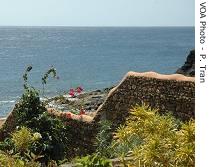-
(单词翻译:双击或拖选)
Praia, Cape1 Verde
15 April 2007
When people talk about Cape Verdean music, it is inevitable2 they mention Cesaria Evora, the singer who introduced many to the country's melancholic3 music known as morna. Some have said that singer Tete Alinho is the island country's next Cesaria. Phuong Tran talks to Alinho at her cliffside home in the capital of Cape Verde where the singer shares her thoughts about why the tiny volcanic4 archipelago west of Africa has produced such enormous talent, and why so many islanders have had to leave.
From her seaside home painted in deep shades of blue and orange that reflect Cape Verde's year-round sun and coastal5 waters, Tete Alinho, 54, can see fishermen hook their catches.
 |
| Singer Tete Alinho's seaside view in Cape Verde |
"This is one song that used to tell that Dakar, Lisbon, Holland, Angola [were] not the solution of our problems," said Alinho. "Cape Verdeans all the time want to leave and go abroad because they were farmers. They were men of the fields. And with all the problems with rain, [droughts], they have no work on the fields."
Severe drought has led to massive waves of immigration that have sent hundreds of thousands overseas to look for work.
That helps explain why today there are more Cape Verdeans living overseas than on the islands.
"Dia c'Tchuva Bem is a very special song with very special words," she said. "I have written these words about the rain. Because rain is very important for Cape Verdeans. The rhythm expressed exactly the relationship between Cape Verdeans, and the land and the rain."
Much of the country's nine inhabited islands is still barren volcanic rock. There are few natural resources, which is why the singer says creativity comes naturally.
Speaking in her native Portuguese6, Alinho says because Cape Verde is poor, people learn to create what nature did not provide.
 |
| Singer Tete Alinho's CDs on display in area shop in Praia, Cape Verde |
But she says most people outside of Cape Verde have probably not heard of most Cape Verdean singers because it is expensive to promote music outside of Cape Verde.
She says it is even difficult to promote music in Cape Verde because people do not want to pay for it.
"When they have to pay for a CD [compact disc] or a concert, 'Oh, it is too expensive.' In Cape Verde, this is not a market that justifies7 what we do," she added. "People begin to [value] a little more our culture and to give a little more importance. But it is a long process. It will take a lot of time."
Alinho says the gradual change is partly a result of islanders seeing how much people overseas like their music.
She says Cape Verdean singers need to perform in other countries to make a living on their own.
But like so many others who have left the island, she says musicians never forget their island roots.
"Cape Verdeans always have this dream to go look for a better way of life, but to come back in the end," continued Alinho.
 收听单词发音
收听单词发音
1
cape

|
|
| n.海角,岬;披肩,短披风 | |
参考例句: |
|
|
|
2
inevitable

|
|
| adj.不可避免的,必然发生的 | |
参考例句: |
|
|
|
3
melancholic

|
|
| 忧郁症患者 | |
参考例句: |
|
|
|
4
volcanic

|
|
| adj.火山的;象火山的;由火山引起的 | |
参考例句: |
|
|
|
5
coastal

|
|
| adj.海岸的,沿海的,沿岸的 | |
参考例句: |
|
|
|
6
Portuguese

|
|
| n.葡萄牙人;葡萄牙语 | |
参考例句: |
|
|
|
7
justifies

|
|
| 证明…有理( justify的第三人称单数 ); 为…辩护; 对…作出解释; 为…辩解(或辩护) | |
参考例句: |
|
|
|















